By James Tabafunda
NORTHWEST ASIAN WEEKLY
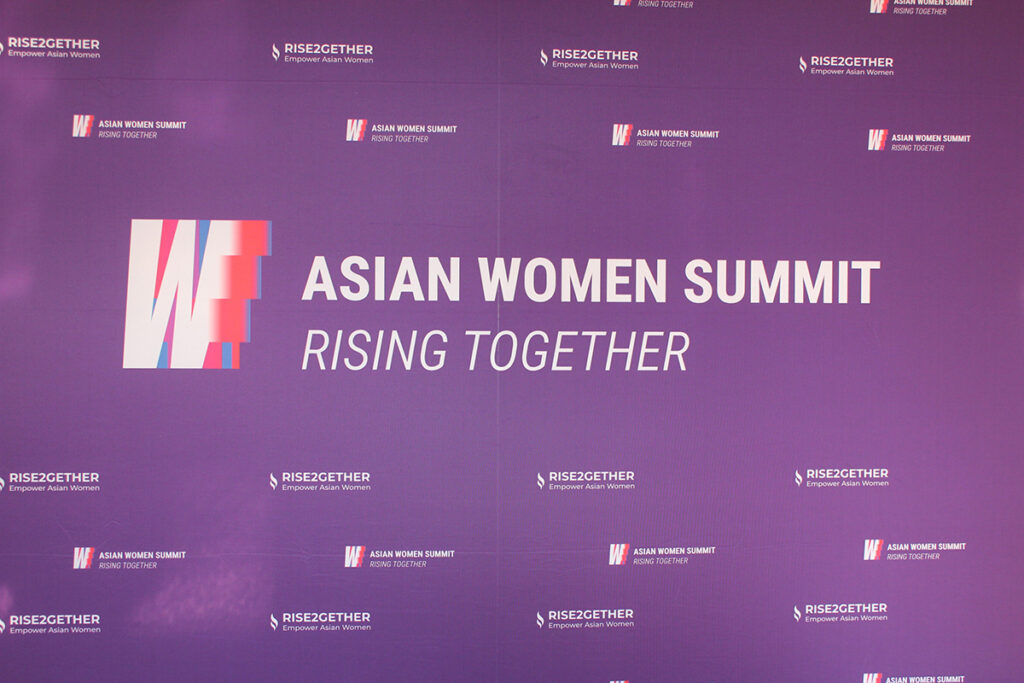
Photography backdrop at the Asian Women Summit (Photo by James Tabafunda)
More than 300 Asian women professionals, executives, entrepreneurs, and students from Washington and across the country filled Seattle’s Broadway Performance Hall on Sept. 13 for the Asian Women Summit (AWS). The event, themed “Rising Together,” marked the first summit hosted by RISE2GETHER, a Seattle-based nonprofit created to advance career development and representation for Asian women.
Organizers said tickets quickly sold out ahead of the summit, highlighting rising demand for empowerment, networking, and leadership opportunities among Asian American women in business, technology, and academia.
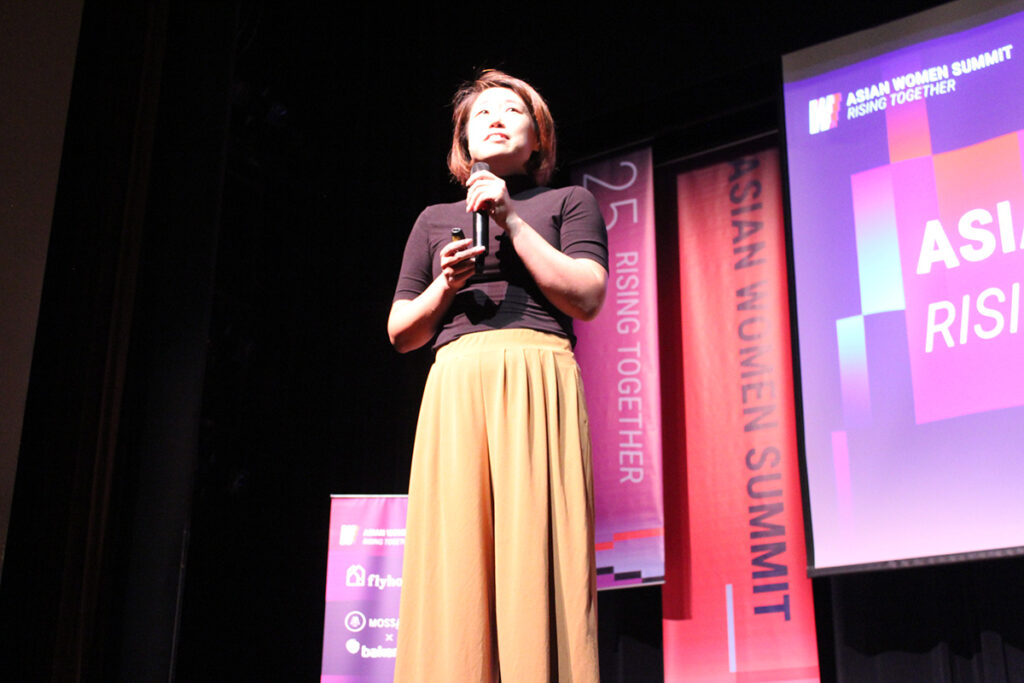
Kexin Xu, founder and CEO of RISE2GETHER (Photo by James Tabafunda)
“Today is a big day,” Kexin Xu, founder and CEO of RISE2GETHER, told the crowd in her opening remarks. “You may think this is about career development—very serious to some extent. But more importantly, it’s more like a social experiment: we get together, have fun. We think it’s more like a party or getaway for all of us. About 350 Asian women leave their home, come here, and have a lot of fun.”
“Just sit tight and get ready for a full day of connecting with as many people as possible. They are all very amazing,” Xu said, setting a positive tone for the day’s program.
Commitment to advancing and developing careers
Founded in June 2024 and run by and for Asian women, RISE2GETHER has quickly emerged as a leader for grassroots change in Seattle’s professional community. The group’s mission is to unleash their full potential by encouraging career advancement, building powerful professional networks, and increasing representation across industries.
In just over a year, the nonprofit organization has hosted more than 40 events in Seattle, engaged over 1,500 attendees—primarily women in their late 20s and early 30s—and partnered with more than 100 speakers and 300 volunteers.
“I had the privilege last year of talking to more than 1,500 amazing Asian women—mostly young professionals in their late 20s and early 30s,” Xu said. “I saw beautiful, powerful, capable, loving, and kind women. But they see themselves with a lot of self-doubt.”
Xu said those conversations expressed the struggles she and her peers faced when starting their own careers without mentorship from the previous generation.
“That’s part of the reason why I reached out to my friends,” she said. “Can we help the younger generation a little bit, because the challenges and hardship don’t go away on their own. Maybe we could do something about it. A year ago, we could never have imagined it would grow to what it has become.”
Keynote on reclaiming voice and leading boldly
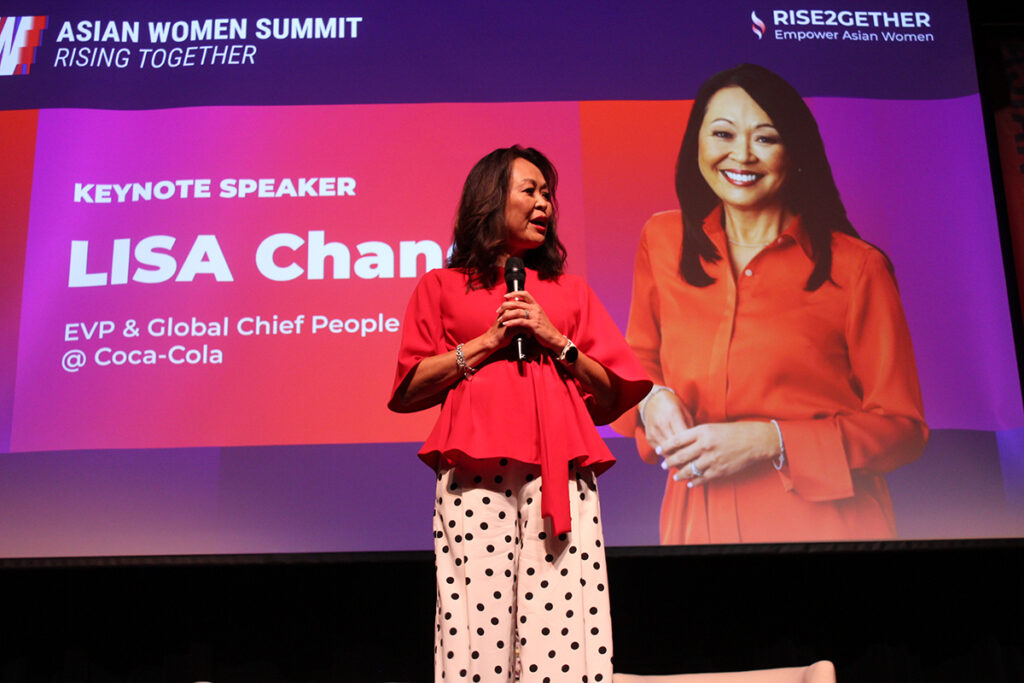
Lisa Chang, global chief people officer at The Coca-Cola Company (Photo by James Tabafunda)
Lisa Chang, global chief people officer at The Coca-Cola Company, delivered a keynote speech at the AWS that drew clear responses from attendees, centering on reclaiming voice, challenging patterns of systemic silence, and developing empowered leadership for Asian American women in corporate America. Drawing on her personal journey—from growing up as the daughter of Taiwanese immigrants in Virginia to reaching senior executive roles—Chang shared candid reflections about identity, family expectations, and career choices.
“I want to do a little storytelling today and share my own personal journey, because I know all of you are forging your own path,” Chang said. She recounted feeling pressured to stay quiet and “not be different,” shaped by lessons from her upbringing. “Most of my life was growing up in a small town, really trying to hide my identity … outside I tried to be as American as I could be,” she said. But Chang’s college years marked a turning point. She said, “There was this group of students that were Asian and they were proud of it. So why can’t I be proud of it?”
Chang also addressed career navigation and countering cultural pressures to comply and avoid risk. “I had a voice. I had a say in the things that I wanted to do that would help me achieve some things that I otherwise didn’t know I could do,” she said, urging attendees to be bold and acknowledge the power of breaking the mold, even against family expectations.
Highlighting barriers Asian women face moving into the C-suite, Chang said, “Of the Fortune 1000 companies, less than half of them even have an Asian board director… and less than 1% [of the C-suite] are women.” She encouraged the audience to see failures as opportunities for growth and said, “Learn from your failures. Don’t hide from them … use your gravestones as your stepping stones instead of having it be your final mark.”
Chang concluded with a call to embrace vulnerability and collective support. “In the corporate world, asking for help is not a sign of weakness … it’s a sign of leadership. Leaders should help others come up with answers. Nobody wants to work with a know-it-all. Everybody wants to work with somebody that brings out the best in each other,” Chang said. She urged the women in the audience to “be bold enough to try something new, brave enough to learn from your failures, and wise enough to ask for help when you need it,” tying her personal journey to the summit’s larger themes of inclusion and rising together.
Three panels
Attendees heard from leaders in technology, artificial intelligence, venture capital, and entrepreneurship.
The first panel, “Allyship and Sponsorship,” focused on how support and advocacy from colleagues can shape professional growth and foster workplace inclusion. Panelists—Lan Ye, Microsoft; Claire Fang, Fullstory; Teresa Chen, Google; Grace Fan, Taskrabbit; and Luci Ni, Moss Adams—discussed practical ways to build strong professional networks, establish mentorship pipelines, and break down organizational barriers. Attendees received actionable insights and resources for advancing equity and representation within their own spheres, aiming to create more supportive and inclusive cultures across industries.
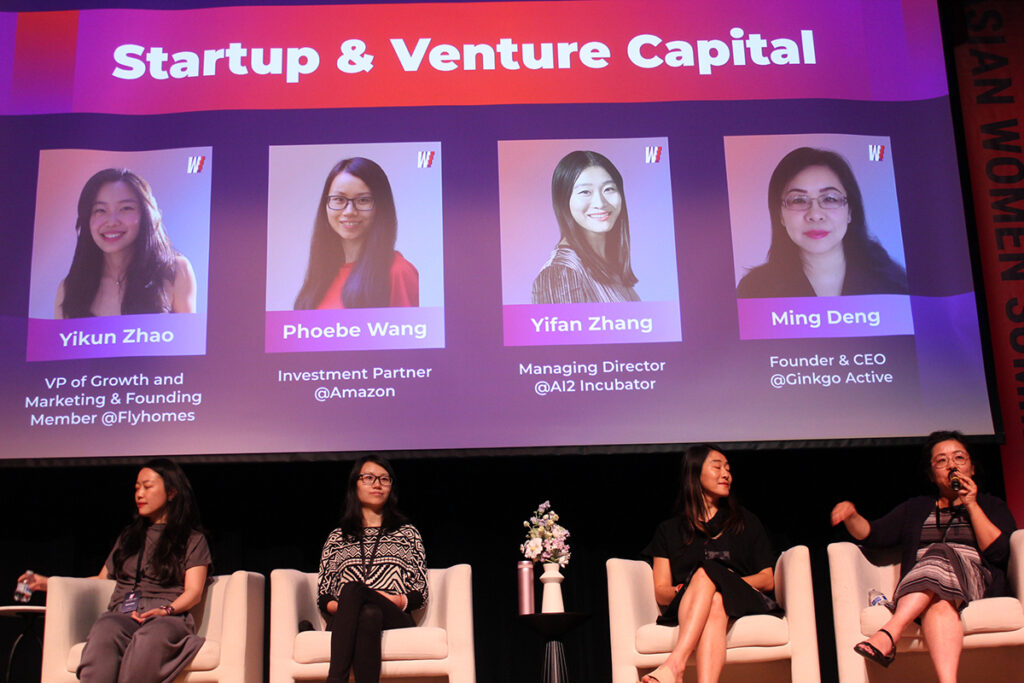
Second panel “Startup & Venture Capital” (Photo by James Tabafunda)
The summit’s second panel, “Startup & Venture Capital,” explored the critical steps and challenges faced by founders and investors in launching successful ventures. Panelists—Yikun Zhao, Flyhomes; Phoebe Wang, Amazon; Yifan Zhang, AI2 Incubator; and Maggie Deng, Ginkgo Active—offered candid advice on securing funding, scaling businesses, and overcoming obstacles. Attendees received practical strategies for pitching ideas, building resilience, and navigating investor relationships in today’s dynamic startup landscape.
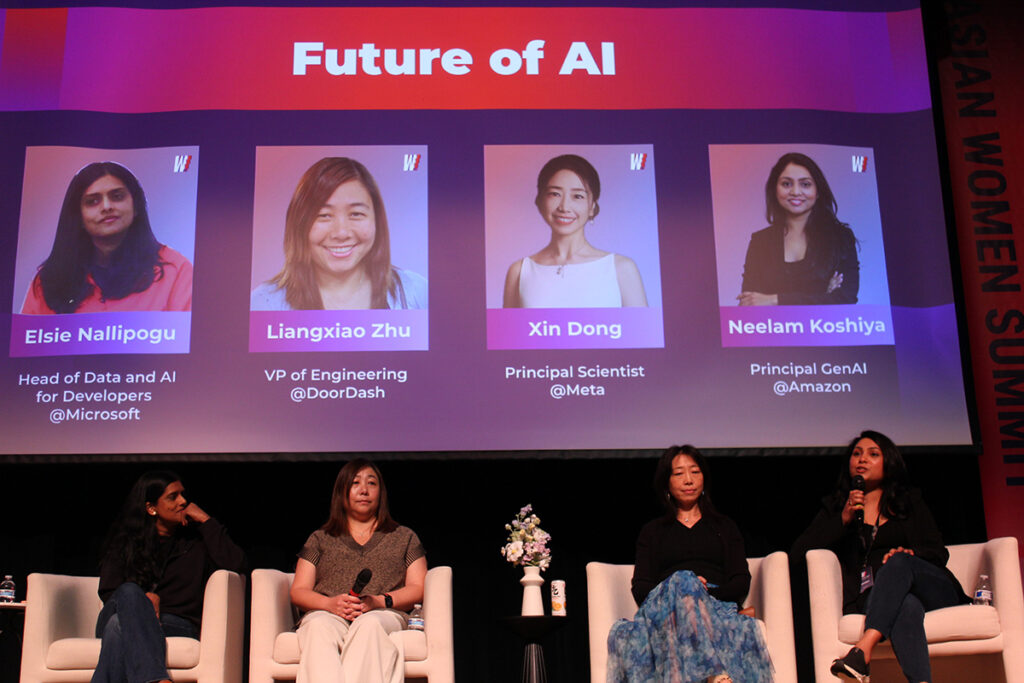
Third panel “Future of AI” (Photo by James Tabafunda)
The third panel, “Future of AI,” examined how artificial intelligence is transforming industries, leadership, and workplace dynamics. Panelists—Elsie Nallipogu, Microsoft; Liangxiao Zhu, DoorDash; Xin Luna Dong, Meta Reality Lab; and Neelam Koshiya, Amazon—addressed both the fast technical advances in AI and the ethical issues posed by algorithmic bias and workforce change. Attendees received practical insight into adapting to new roles, lifelong learning, and leveraging AI-driven opportunities while emphasizing responsible innovation and inclusive professional growth.
Influence others
Rachel Huang, a tax manager at Baker Tilly’s Seattle office, attended the AWS to connect with others and strengthen her support network as both a professional and a mentor. Baker Tilly and Moss Adams recently merged, forming the sixth largest advisory firm in the U.S., now boasting more than 11,000 professionals in over 90 locations.
Reflecting on her summit experience and her question-and-answer exchange with panelist Lucy Ni, she said, “Lucy gave the two words—right? You cannot control other people’s decisions or what they want to do, but you can influence them. So I think that’s definitely helpful. That’s part of my struggle, the challenge that I’m facing internally as the BRG (business resource group) officer.”
“I want to encourage other people to do as well, and how I’m going to influence that and help other people…to help this Asian community as well. She was right,” Huang said. “The thing I can only do is to show up and do the best I can and to do what I want, to do what I believe in.”
Huang described her move from Florida to Seattle and her motivation for mentoring: “When I started my career, I was in a male-dominated environment. I found my community when I moved to Seattle.”
“What can I do to help the younger generation?” Huang asked.
Now a mentor to three junior staff members, she sees her role as an opportunity to give back and be the mentor she wishes she had when she was younger.
Acknowledgment of volunteers
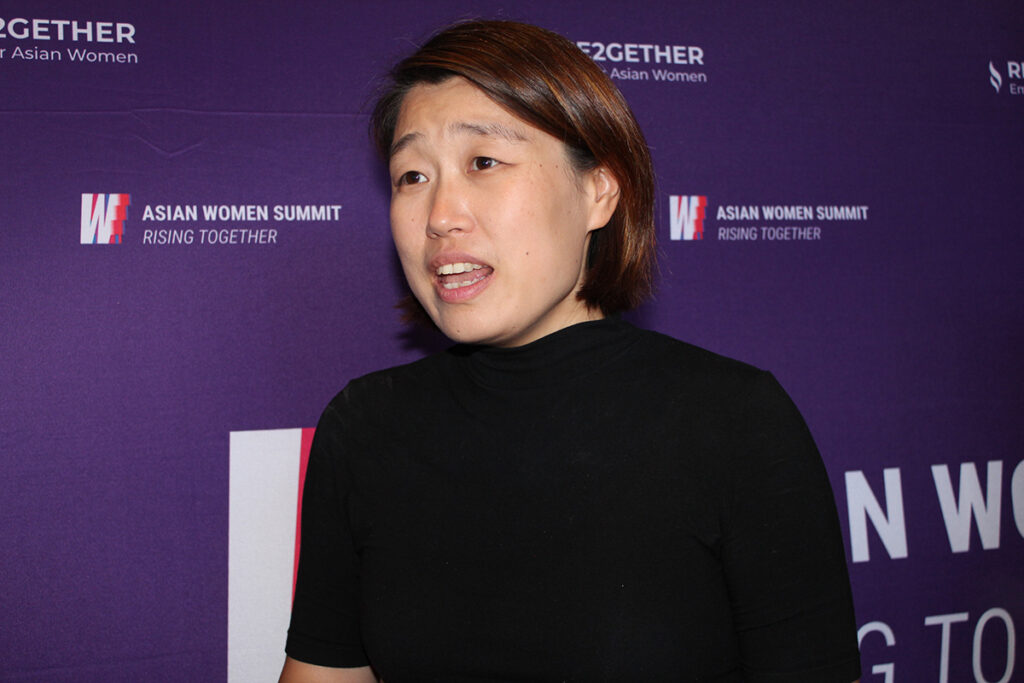
Kexin Xu, founder and CEO of RISE2GETHER (Photo by James Tabafunda)
RISE2GETHER ended its first year with more than a total 2,000 attendees and 150 speakers at its events, a feat made possible by a dedicated network of volunteers. “Just today alone, we have 60 volunteers on site and behind the scenes,” said Xu. “We’ve had 30 or 40 people working together for months—everything you see was created by our community.”
Xu added, “We truly mean it when we say every Asian woman should be seen and heard.” She summarized the summit’s impact: “Our mission resonates, and community is rising together.”
For more information about the Asian Women Summit, go to www.rise2gether.co.

